
Whitley Monahan Handle
Family-Owned Whitley Monahan Handles Has Been Making Products You Use Every Day Since 1960 in Midland, NC
Part 1: Started on Faith and Family
Bunk and Arlene Whitley founded Whitley Manufacturing in 1960 in Midland, NC. Not only is L.W. “Bunk” Whitley credited with incorporating Midland in 1999, but he was also the town’s first mayor. He was an integral part of efforts to prevent annexation of the town by fast-growing neighboring municipalities before he passed away in 2005. The company name changed to Whitley Handle, Inc. and again to Whitley Monahan Handles after a merger with Illinois-based Monahan Company. But locally, they are still referred to as Whitley Handle.

Arlene vividly remembers getting the company off the ground. “We received our first several invoices, and I asked myself…how are we going to pay these? But I asked the Lord and He said we would be ok,” she said. If you have never put all of your hopes and dreams into opening a business, you may not realize what a strong role faith plays in that decision, but Arlene certainly did, and it has worked out well for her family.
At 90 years old, she still comes into the office four days a week, but their son-in-law Patrick Peebles runs the operation today. Patrick’s was invited to get involved with the business when Bunk had a heart attack and had to slow down. Bunk lived and worked alongside Patrick for another 20 years, and he feels lucky to have had the opportunity to benefit from his wisdom and experience during that time.
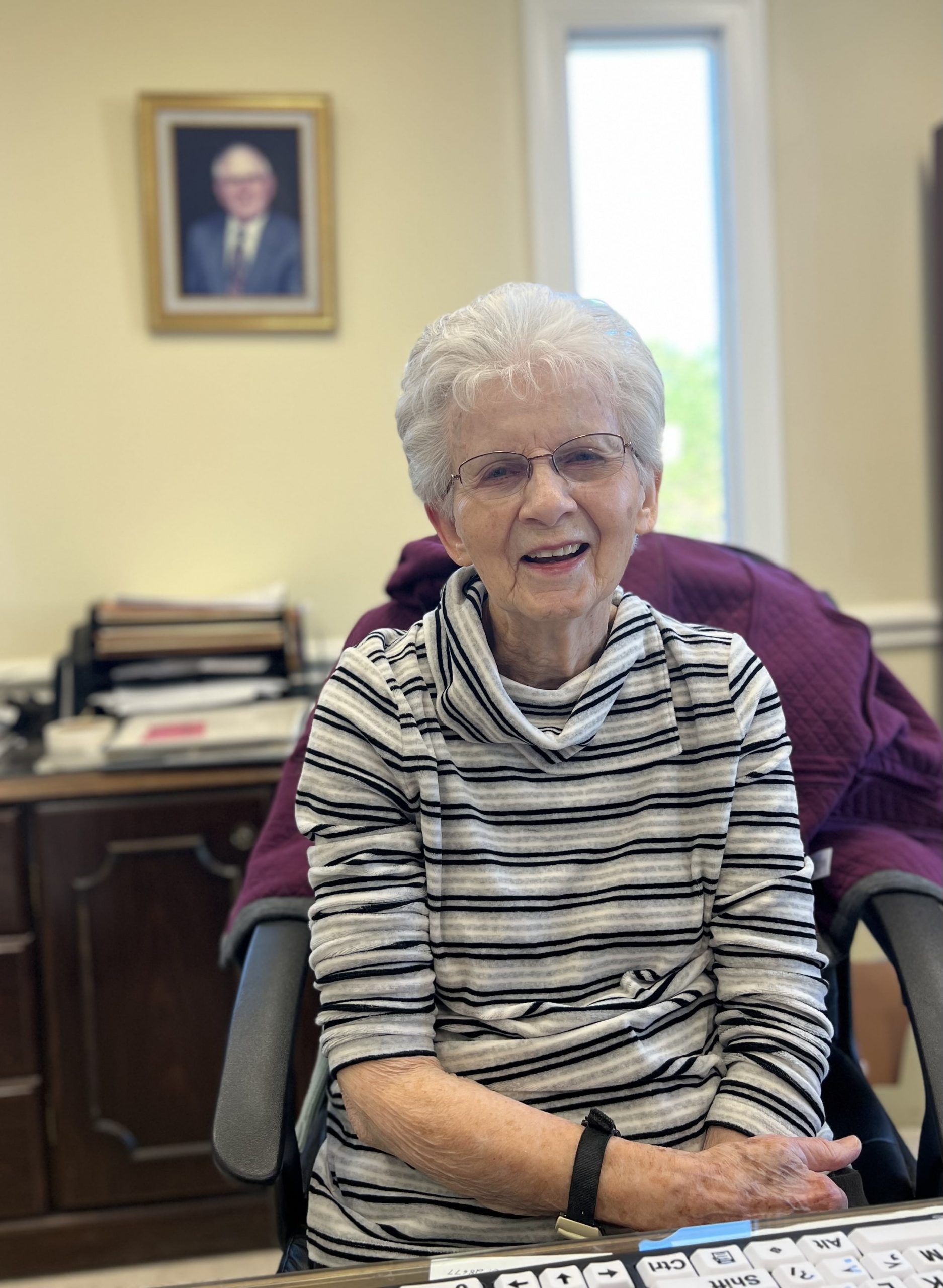
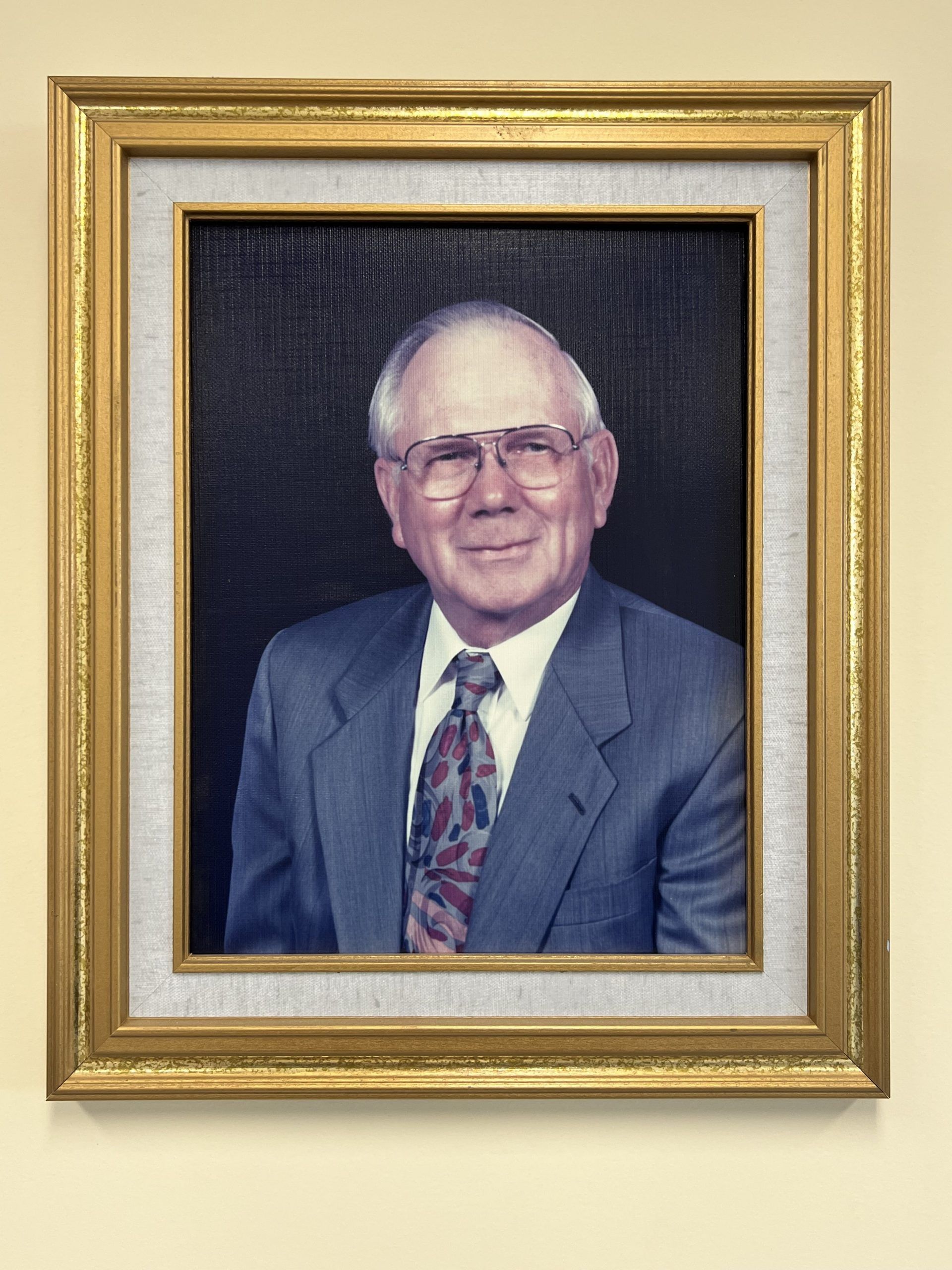
Whitley Handle continues to be a family business with two of Patrick’s sons (28-year-old twins) working for the company and his wife, Lorraine, serving as the company’s controller. One of his sons, Ryan (pictured with his Dad) oversees production on their newest state-of-the-art finishing equipment that they purchased in 2015 which also required adding a new building to their facility. He likes working for the company because “there is something new happening every day.”
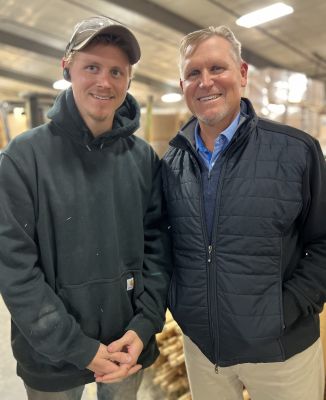
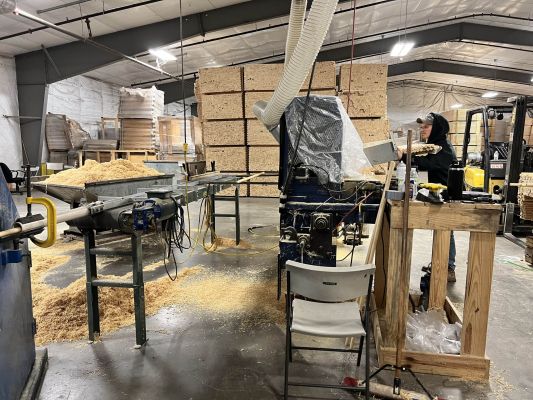
Today, Whitley Handle employs approximately 40 people, many of whom have been with the company long-term including several with over 30 years of experience. Patrick himself started on the production line when he was just a kid.
A Staple in the Wooden Handle Industry
The company makes many different types of wood handles and wood dowels and sells them on a wholesale/commercial basis, primarily to the broom and mop industry. In the beginning, most of their business was in consumer household cleaning handles, but in today’s market more of those handles are now metal. Whitley considered expanding their production to handle metal handles, but in the end, it was too expensive. They stay busy today because they focus on heavy duty commercial brooms and flagpoles which have both seen slow, steady growth. Flagpole demand in particular
When you are at the store shopping, you won’t see Whitley Handle’s name on any products because their customers are the manufacturers who make brooms. But you have most definitely seen their products on the shelves if you have ever bought a commercial Rubbermaid broom.
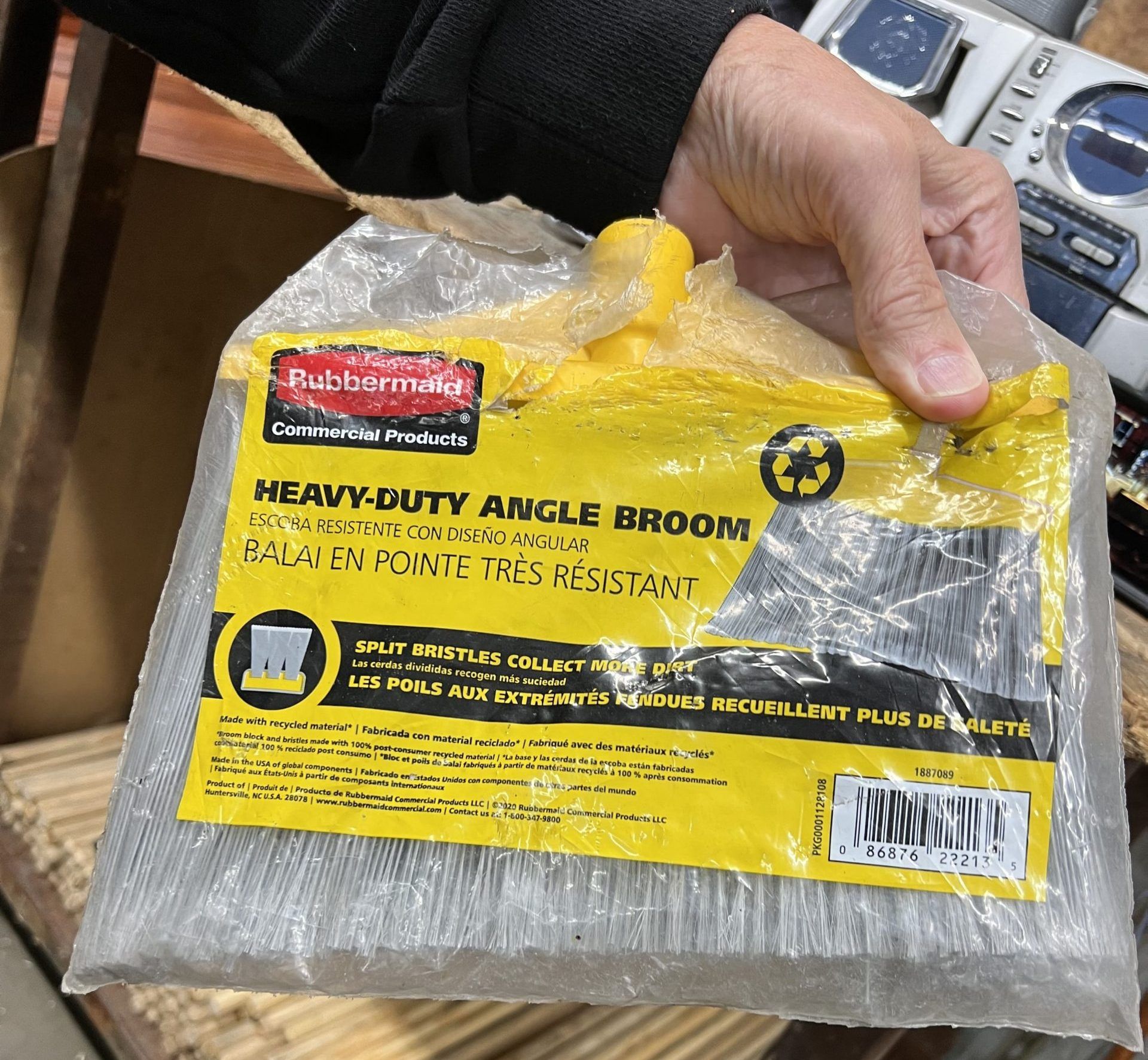
Other clients include Quickie®, which is headquartered in Huntersville, NC and makes the Quickie® BulldozerTM industrial broom that still uses a wooden handle. Whitley also has clients who have been with them for 35 years, like the O’Dell Corporation who makes corn/fiber brooms and was founded by a young Marine named William O’Dell in Ware Shoals, SC.
Changing with the Times
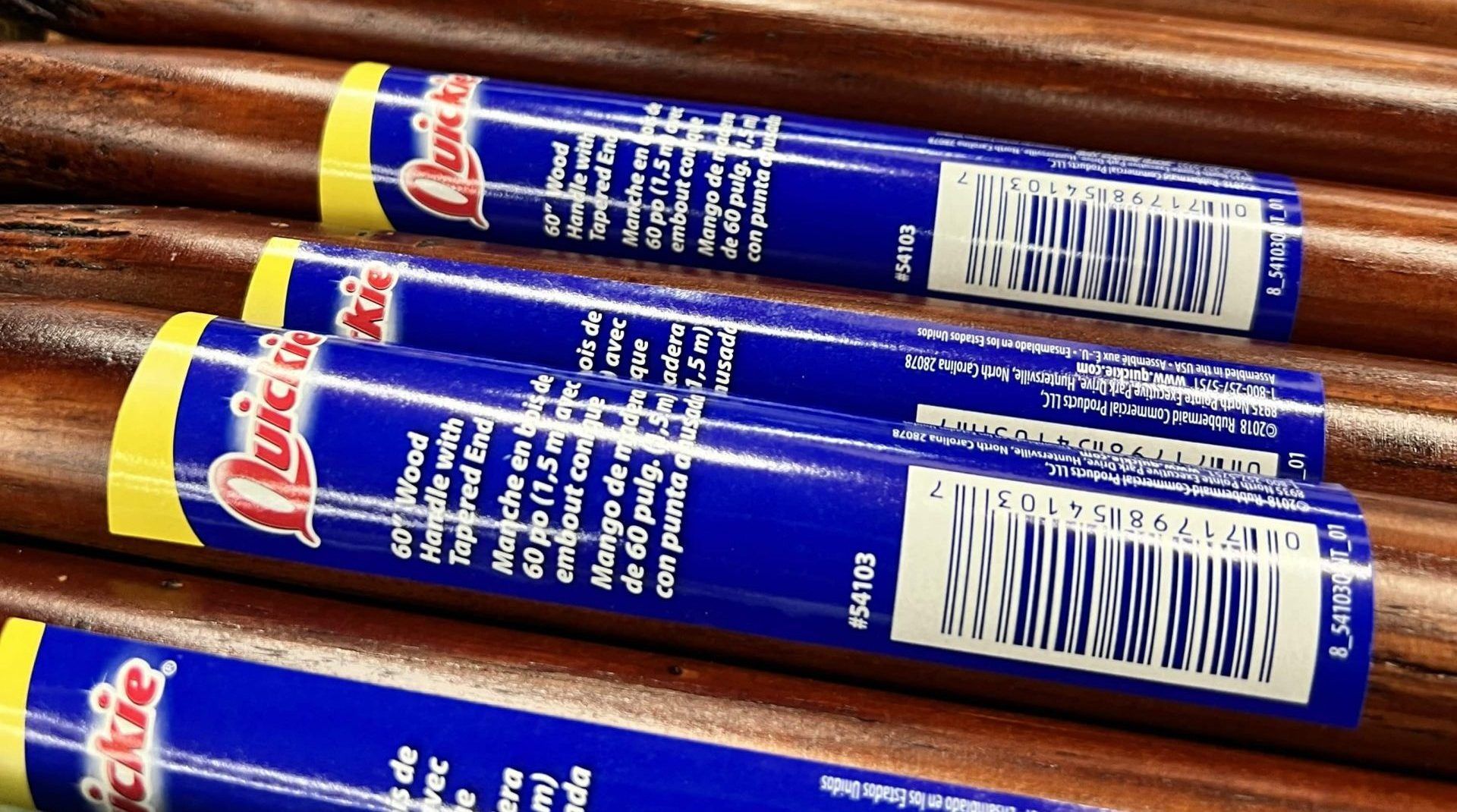
Did you know that the bristles that come out of the top of corn stalks are used for brooms? Well, not from the stalks that grow the ears of corn we all love to eat, but instead from the plume of specific corn for brooms, called broomcorn.
The largest change that affected Whitley Handle’s business was in the early 2000s when the North American Free Trade Agreement (NAFTA) was approved. Suddenly, the entire industry went abroad, with even broomcorn being grown in Mexico. Whitley had to reinvent themselves to stay competitive. They focused their efforts on making promises that others in the industry weren’t making, and that was being able to deliver products based on their clients’ needs. Short turnaround times were difficult overseas and some of the quality dropped at that time.
Much of the broom industry was centered in the Midwest prior to that because that is where the majority of broomcorn was grown. Arcola, Illinois was a leading producer of brooms into the early 1900’s and can rightfully claim the title of Broom Making Capital of World, according to the Arcola Chamber of Commerce.
Patrick decided to partner with one of his competitors, Monahan Company, who was based in Arcola to expand their operation. Barry King moved to North Carolina from Illinois in 2007 and instilled a lot of new processes that made the company stronger. “We would never have been able to grow if it weren’t for Barry’s customer knowledge and organizational skills that he brought with him,” he said. Not surprisingly, Barry fell in love with the Carolina climate and has been here with the company ever since.
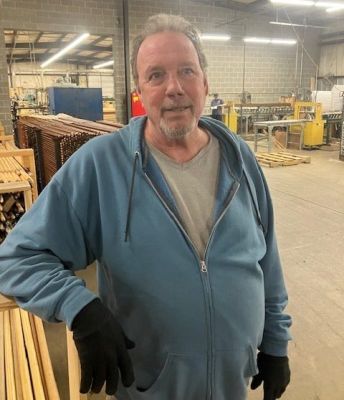

Part 2: The People Behind the Handles
How has a company quietly operating in rural Midland, NC stayed in business all of these years? Quite simply, because of its people. But like so many businesses, they still struggle to find new employees. During our visit, Business Support Manager Stephanie Burleson, listened to their staffing needs and helped connect them with NC Works, which offers a variety of services to support small businesses with recruitment.
“The good news is that there are a lot of resources in our community. Unfortunately, most business owners don’t have the time to try to find them. At the EDC, we are a one stop shop for businesses to find the support that’s available,” said Burleson.
“For instance, NC Works is a resource for connecting businesses with potential employees and was the perfect place for Whitley to turn for creative solutions to their staffing needs.”
Employees like Gina Self love working at Whitley, and for her, it’s all in the family too. She and her brother both work there and her Dad actually trained Patrick when he was younger. “I love having my own little station where I am in control of my workflow, and I couldn’t ask for a better employer than Patrick,” she said.
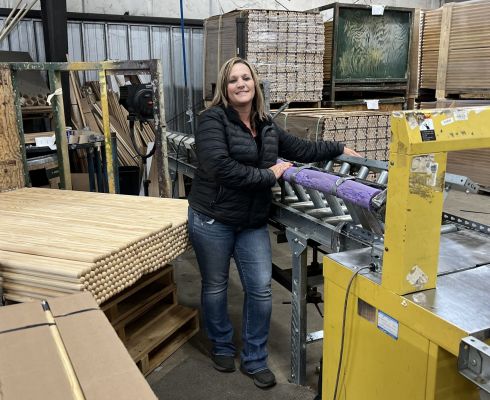
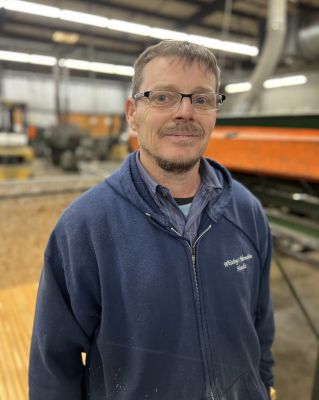
Mutually Beneficial Second Chances
One of the ways Whitley Handle recruited employees was by participating in the work release program in Mount Pleasant for almost 20 years. We spoke with one of those employees who still works with the company today about how that program changed his life.
“I started working at Whitley one year before my release and I remember that Pat didn’t treat us any differently than any of his other employees.” In fact, Patrick went above and beyond to make the program a rewarding experience for them. “After three years of eating nothing but jail food, Patrick would treat us to dinner at a nearby Chinese restaurant after our shift. It tasted amazing, but more than that, it made me feel good about myself.”
He added, “Back then, I didn’t think I would ever have a rewarding job that made me money. But I’ve had the opportunity to grow in my job here and even made supervisor. I’ve paid off my home and am putting both of my kids through college. None of that would have happened if Pat hadn’t given me a chance.”
Partnership with Cabarrus Vocational Works
Whitley Handle has a 10+ year partnership with Cabarrus Vocational Opportunities whose mission is to provide opportunity and training for adults with disabilities to develop work habits and skills leading to employment. CVO employees were adding a no-spin piece to Whitley’s flagpoles to keep the flag from moving around the pole.
This partnership speaks volumes about the type of company Whitley Handle is and the values of it’s president, Patrick. He interacts with each and every one of them and they light up when they see Patrick. They know that he values them by the way he treats them, and the employees are genuinely happy to have work and to be needed. Whitley Handle kept the employees at CVO busy during COVID, and they even used the WH flagpole, which is approximately 5 feet long, as a measuring stick for distancing.
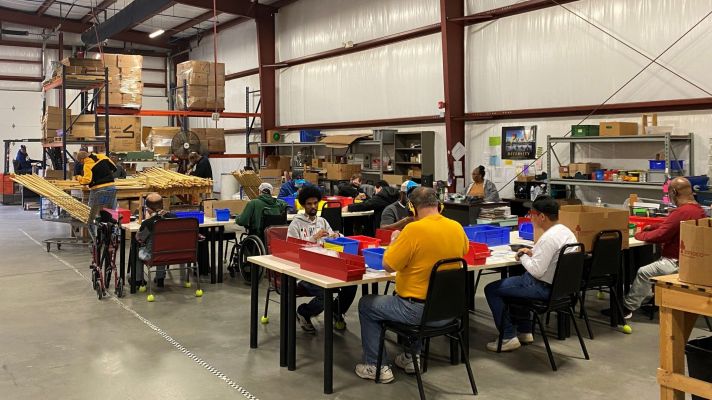
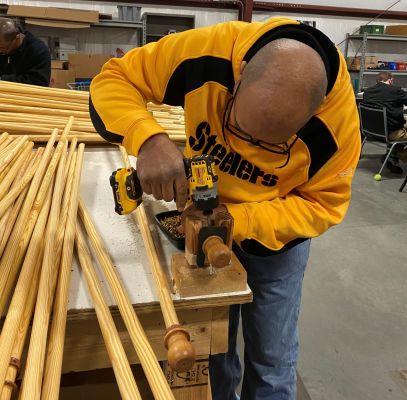
Whitley Handle is deeply rooted in the Midland community, and they support organizations like the Boy Scouts of America, providing their walking staffs or products for Eagle Scout projects. Patrick welcomes anyone to visit their facility and certainly to apply for employment with them as they look to the next generation of Whiley Handles being produced in Cabarrus County. Learn more by about their company and products at whitleyhandle.com.